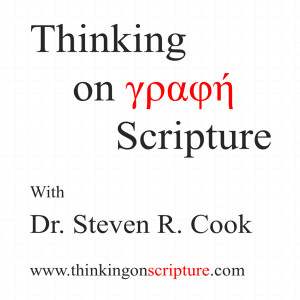
Saturday Mar 09, 2019
Joel 2:1-17
Joel 2:1-11 is generally understood three ways: 1) an invasion of a human army from the north such as the Assyrians, 2) an eschatological event describing a future judgment, or 3) a threat of another locust invasion like the one described in chapter one. The last view makes the most sense because of the use of military similes in verses 4-7 and the specific reference to locusts in verse 25. This last view would understand the “day of the Lord” in Joel 2:1-2 as a threat of local judgment upon the generation of Joel’s day. Joel describes the swarm of locusts as a consuming fire (Joe 2:3), and as an invading army of war horses, chariots and people (Joe 2:4-5), who instill fear among the Israelites (Joe 2:6). This army of locusts crosses over the city walls, breaks through its defenses and enters homes (Joe 2:7-9). The swarm is so vast it causes the ground to tremble and even blocks out sunlight (Joe 2:10). This invading army is “His army”, sent by the Lord upon His people (Joe 2:11). It is proper to understand God’s judgment as a manifestation of His righteous character in which He punishes those who fail to conform to His good laws. However, God is never quick to judge, and His threat of punishment is temporarily suspended as He calls His people to national repentance, saying, “Return to Me with all your heart, and with fasting, weeping and mourning; and rend your heart and not your garments” (Joe 2:12-13a). God’s offer to avoid judgment is born out of His good nature, as He declares, “Now return to the LORD your God, for He is gracious and compassionate, slow to anger, abounding in lovingkindness and relenting of evil” (Joe 2:13b). Some argue that God cannot change and understand the offer to “relent” as an anthropopathism. Though it is true that God does not change with regard to His essential nature, He can change His course of judgment into blessing, if His people turn back to Him. In fact, the whole of Deuteronomy chapter 28 is predicated on a plain understanding that blessing and cursing is promised to Israel, His covenant people, dependent on their obedience or disobedience to His just laws. With the call to repent Joel states, “Who knows whether He will not turn and relent and leave a blessing behind Him, even a grain offering and a drink offering for the LORD your God?” (Joe 2:14). Agricultural prosperity would signify God’s blessing rather than judgment, and this blessing would allow them to resume normal religious functions. God’s call to national repentance was to be led by Israel’s priests (Joe 2:17), who were to “Blow a trumpet in Zion, consecrate a fast, proclaim a solemn assembly, gather the people, sanctify the congregation, assemble the elders, and gather the children and the nursing infants” (Joe 2:15-16a). Even newlyweds, who were normally exempt from public functions (Deu 24:5), are called to participate (Joe 2:16b). The priests were to “weep between the porch and the altar” at the temple, crying out to the Lord, saying, “Spare Your people, O LORD, and do not make Your inheritance a reproach, a byword among the nations. Why should they among the peoples say, ‘Where is their God?’” (Joe 2:17). The national cry not only displayed humility before God, but sought to protect His reputation among the nations who might see Israel’s destruction as an indication their God was too weak to protect them.
No comments yet. Be the first to say something!